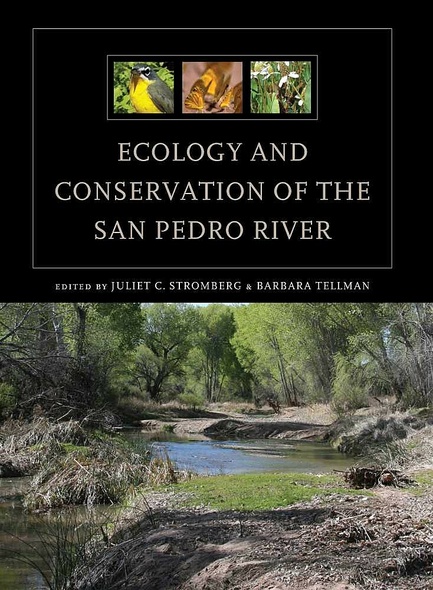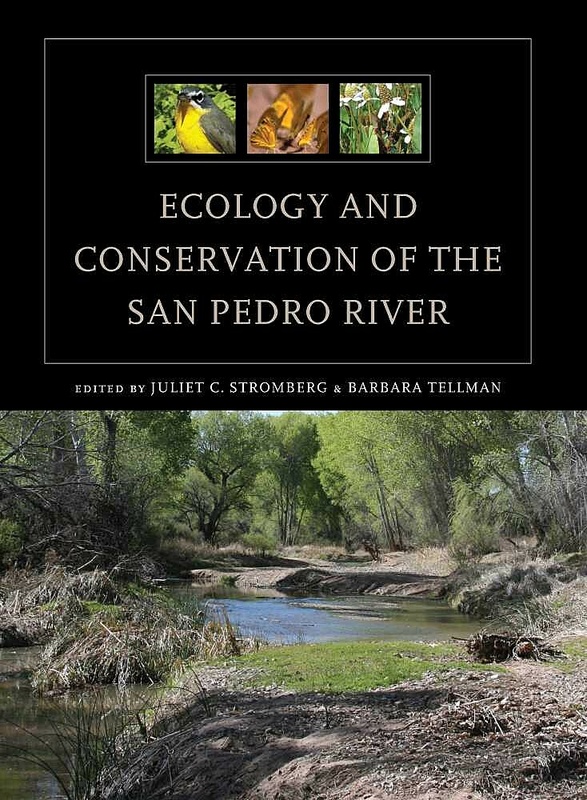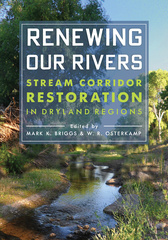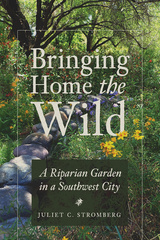Ecology and Conservation of the San Pedro River
Edited by Juliet C. Stromberg and Barbara Tellman
The University of Arizona Press
One of the last undammed perennial rivers in the desert Southwest, the San Pedro River in southeastern Arizona illustrates important processes common to many desert riparian ecosystems. Although historic land uses and climatic extremes have led to aquifer depletion, river entrenchment, and other changes, the river still sustains a rich and varied selection of life. Resilient to many factors, portions of the San Pedro have become increasingly threatened by groundwater pumping and other impacts of population growth.
This book provides an extensive knowledge base on all aspects of the San Pedro, from flora and fauna to hydrology and human use to preservation. It describes the ecological patterns and processes of this aridland river and explores both the ongoing science-driven efforts by nonprofit groups and government agencies to sustain and restore its riparian ecosystems and the science that supports these management decisions.
An interdisciplinary team of fifty-seven contributors—biologists, ecologists, geomorphologists, historians, hydrologists, lawyers, political scientists—weave together threads from their diverse perspectives to reveal the processes that shape the past, present, and future of the San Pedro’s riparian and aquatic ecosystems. They review the biological communities of the San Pedro and the stream hydrology and geomorphology that affect its riparian biota. They then look at conservation and management challenges along three sections of the San Pedro, from its headwaters in Mexico to its confluence with the Gila River, describing legal and policy issues and their interface with science; activities related to mitigation, conservation, and restoration; and a prognosis of the potential for sustaining the basin’s riparian system.
These chapters demonstrate the complexity of the San Pedro’s ecological and hydrological conditions, showing that there are no easy answers to the problems—and that existing laws are inadequate to fully address them. Collectively, they offer students, professionals, and environmental advocates a better grasp of the San Pedro’s status as well as important lessons for restoring physical processes and biotic communities to rivers in arid and semiarid regions.
This book provides an extensive knowledge base on all aspects of the San Pedro, from flora and fauna to hydrology and human use to preservation. It describes the ecological patterns and processes of this aridland river and explores both the ongoing science-driven efforts by nonprofit groups and government agencies to sustain and restore its riparian ecosystems and the science that supports these management decisions.
An interdisciplinary team of fifty-seven contributors—biologists, ecologists, geomorphologists, historians, hydrologists, lawyers, political scientists—weave together threads from their diverse perspectives to reveal the processes that shape the past, present, and future of the San Pedro’s riparian and aquatic ecosystems. They review the biological communities of the San Pedro and the stream hydrology and geomorphology that affect its riparian biota. They then look at conservation and management challenges along three sections of the San Pedro, from its headwaters in Mexico to its confluence with the Gila River, describing legal and policy issues and their interface with science; activities related to mitigation, conservation, and restoration; and a prognosis of the potential for sustaining the basin’s riparian system.
These chapters demonstrate the complexity of the San Pedro’s ecological and hydrological conditions, showing that there are no easy answers to the problems—and that existing laws are inadequate to fully address them. Collectively, they offer students, professionals, and environmental advocates a better grasp of the San Pedro’s status as well as important lessons for restoring physical processes and biotic communities to rivers in arid and semiarid regions.
“This unique approach of incorporating multiple disciplines to holistically address ecosystem structure and function will contribute significantly to the future of natural sciences.” —Joseph Fontaine
“This is a valuable compilation of research on an important riparian area with policy, conservation, and socioeconomic implications.” —Edward Glenn
Juliet C. Stromberg is an associate professor in the School of Life Sciences at Arizona State University. Barbara Tellman is retired from the Water Resources Research Center at the University of Arizona.
W. James Shuttleworth
Acknowledgments
Introduction
Juliet C. Stromberg and Barbara Tellman
SECTION 1 Vegetation of the Riparian Ecosystem
SECTION 2 Animals of the Riparian Ecosystem
SECTION 3 The Geomorphic Template
SECTION 4 The Hydrologic Template
SECTION 5 Conservation and Management
Summary — Weaving the Threads Together
Juliet C. Stromberg and Barbara Tellman
Glossary
Literature Cited
Index
About the Editors
List of Contributors








